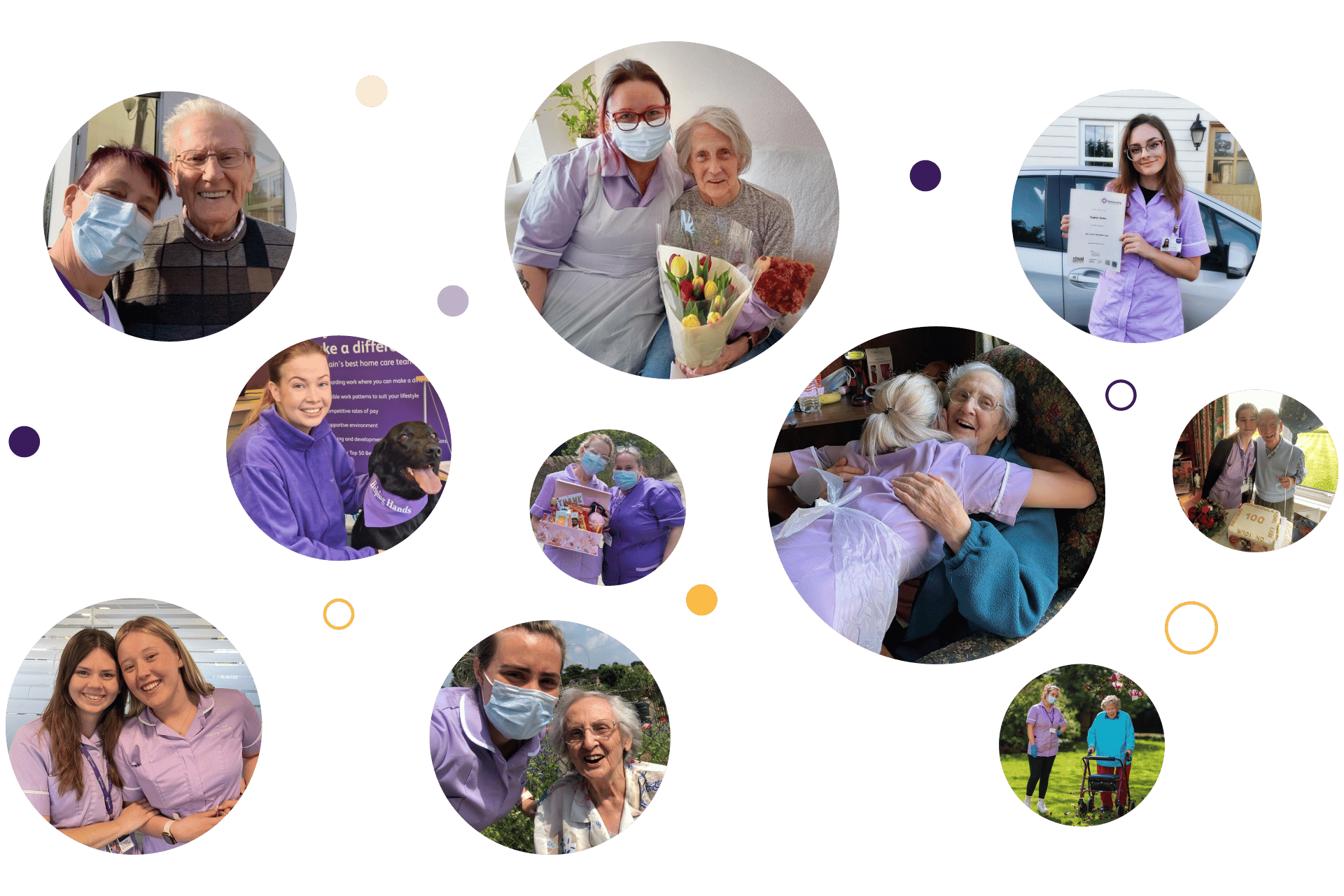End-of-life support plans
End-of-life care at home
Preparing for those final days and moments can be difficult for both the person who is unwell and for their loved ones, but planning appropriately for this difficult time can leave you feeling reassured that everything is taken care of and that all of your wishes will be carried out.
If you choose to have end-of-life care at home, our dedicated team will meet with both you and your family to create a support plan that is completely tailored around you, your wishes and your needs. That way, you can all work from the same agreed plan that is led by your preferences and choices, enabling you to pass away in a dignified and respectful way.

What is an end-of-life support plan?

An end-of-life care plan contains everything a carer needs to know about their customer.
An end-of-life support plan includes specific instructions about caring for someone in their last days before they have passed away, and in the days following their death. The support plan is created during the customer’s assessment with a care manager.
Due to the nature of end-of-life and palliative care, support plans are flexible and can be altered when a customer reaches the last days of their life. If a customer is unable to leave their bed or becomes nil by mouth, amendments can be made to reflect both the customer’s and their family’s wishes of keeping them as comfortable as possible. An end-of-life support plan also acts as an agreement between the customer, their carer and their family, enabling the customer’s wishes to be respected before and after death.
An end-of-life support plan will include information about:
Personal care
Medication
Nutrition and hydration needs
Medical details
What goes into an end-of-life support plan?
An end-of-life support plan requires a wide range of information about care requirements.
A care manager will create the support plan with the customer and often with family present. Due to the sensitive nature of end-of-life care, a customer’s support plan has clear and informative directives that are agreed during the initial assessment, which are carried through until the customer has passed away – and sometimes for days or weeks afterwards.
This may include specific instructions for the carer to carry out during the customer’s last moments and support for their family after they have passed away.

The support plan covers the following areas:
Personal details
Name, address, next of kin information and other health professionals involved, including their GP. This may also involve the details of their district nurse or contact from Marie Curie or a similar organisation that specialise in supporting those at the end of their life. Important documents such as Power of Attorney (POA) and Do Not Resuscitate (DNR) would also be included here.
All about me
Information such as interests, wishes and spiritual needs would be included, as it’s important to ensure the customer’s final requests are met. They may have religious routines that they may want carried out before they pass, or they may wish to have certain loved ones present in their last few hours of life. There may also be details of what their wishes are for after they have passed away, in order to assist their loved ones.
Nutrition and hydration needs
This could initially be having meals prepared or administered via a PEG feeding tube or specific instructions of which foods they can eat, but may change to nil by mouth as the customer progresses into the final days or hours of life
Personal care
All aspects of personal care that they need to be carried out for them or that they need assistance with, such as toileting needs, getting dressed, helping with a stoma or catheter, and help with washing or showering
Mobility requirements
The amount of support required to mobilise safely at home. This could be help getting in and out of bed, hoisting or regular turning in bed.
Consent
Signed consent from the customer that they are happy with the support plan and the service agreement. If the customer is unable to sign, their POA can do this on their behalf.
How we can help with your end-of-life support plan

Broaching the topic of end-of-life care can be quite an upsetting notion, particularly with spouses or children. Although this is difficult, discussing your preferences can ensure that you spend your last days in comfort and in the knowledge that your final wishes will be adhered to.
Our care teams have experience in assisting those with end-of-life care, and are able to offer you and your family the appropriate support and guidance. From liaising with other organisations involved in your health care, providing specific clinical care related to your condition, to psychological support for both you and your loved ones – we’ll ensure that the right carer is assigned to you in both experience and personality, so that you get the practical and emotional care that suits you.
Our clinical team
For those with complex care needs who are also receiving end-of-life care, we have a team of clinicians who oversee the support plan and delivery of care. This could include someone with a stoma, catheter or PEG feeding tube. A clinical nurse would be responsible for liaising with the care manager and carer to ensure they have the correct procedures in place for the customer’s specific clinical needs. Carole Kerton-Church, Regional Clinical Lead for the London and Essex areas, has over 10 years’ experience as a nurse, working with patients with long-term health conditions and those receiving end-of-life care. Find out more about Carol.


Amazing carers, delivering quality care
We’re extremely proud of our carers who are committed to providing exceptional support day in, day out. We only hire the most compassionate, dedicated applicants to our care teams, and perform advanced DBS checks to ensure they’re the type of person you’d be happy to have in your home.
When they join us, every carer receives our industry-leading training, which equips them to provide a wide range of care services to people with varying needs. They’ll then continue to participate in regular refresher courses to ensure their knowledge and skillset are always up to date with the latest care industry standards.
Kind and compassionate
At Helping Hands, we have a rigorous recruitment process which means we only hire kind, empathetic carers who share our person-centred family values
Directly employed by us
We directly employ all of our carers, so we take full responsibility for managing their workload, maintaining their well-being and paying them
Expertly trained and fully vetted
Every carer is fully DBS-checked and receives our industry-renowned training which equips them to provide a wide range of specialist care services
Page reviewed by Carole Kerton-Church, Regional Clinical Lead, on November 8, 2021.